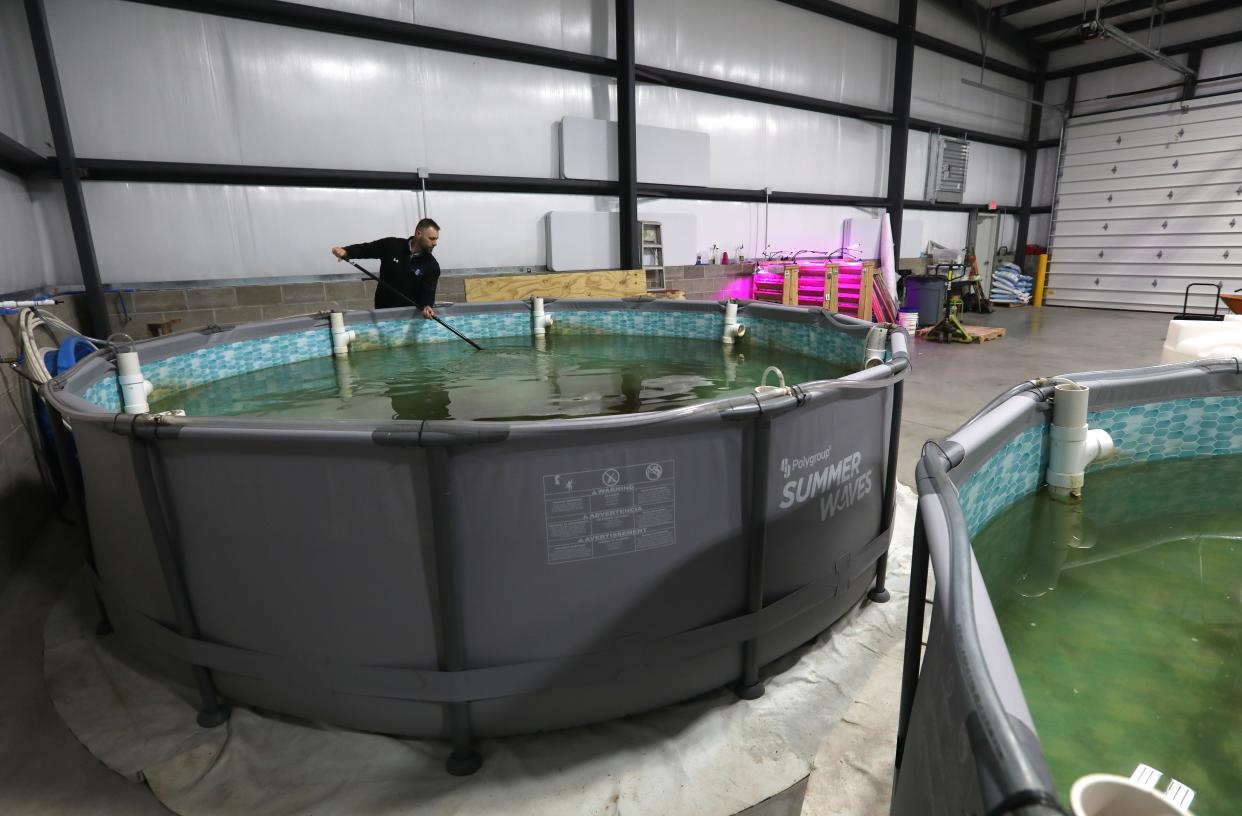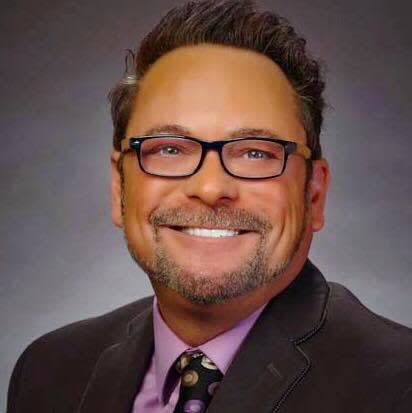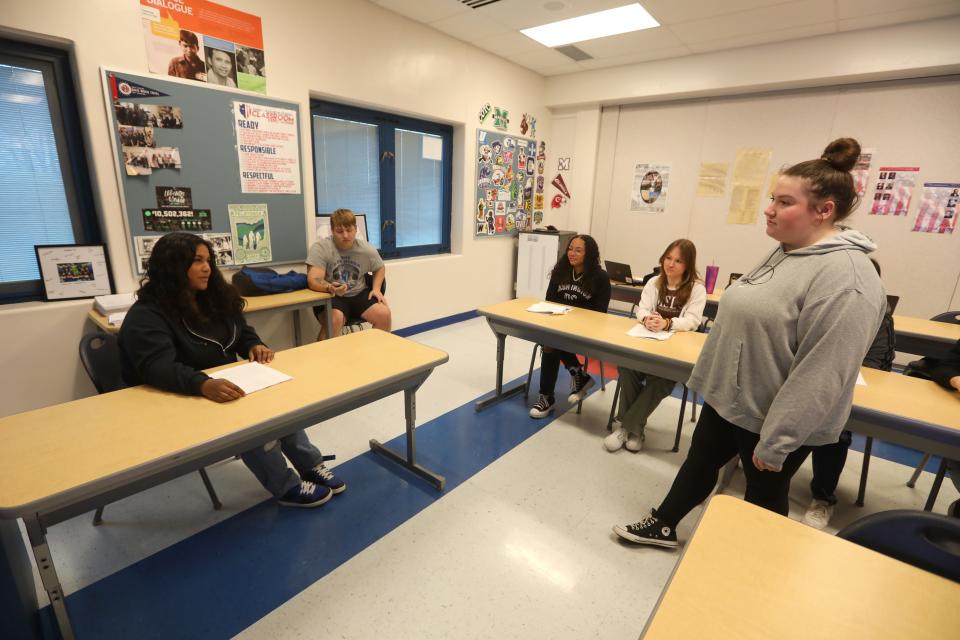ZCS: Education is more than a diploma

ZANESVILLE −A silver cloud of hundreds of small fish dart around a pair of round swimming pools in Zanesville City School's AgriPark building. The fish are part of a sustainable agriculture program the district began earlier this school year, and represent a portfolio of non-traditional programming the district hopes will provide educational avenues to explore and instill an entrepreneurial spirit in students.
The sustainable agriculture program is a science class wrapped in an agriculture class. Students take pH measurements to make sure the fish have healthy water, and temperature measurements to ensure optimal growing conditions. Eventually the fish, tilapia, will grow large enough to market with the school's partner on the project, Ashtyn Chen, who owns The Ocean's Friend Aquaculture in Pataskala.

The program gives students a chance to experience a career they likely had not considered, but, equally importantly, it might show students something they don't want to do. "They don't know what they don't know," said Steve Foreman, Zanesville City Schools assistant superintendent.
"We are not trying to put out 45 fish farmers," Foreman said. "I want them think outside the box. This is to show them the entrepreneurial piece, where you can start something, fish farming, and make a go of it.
"I want kids to explore other options," he added.
Soon, the fish's waste will fertilize a vegetable garden in a new greenhouse to be built alongside the AgriPark. It will expand the sustainable agriculture program, and allow students to see the fruits (and vegetables) of their labor. From the garden, students will take that produce to a newly-remodeled kitchen at the Zanesville Community School and learn to prepare a meal. That could lead to a ServeSafe certification, leading to opportunities or careers in the restaurant industry.
"It is not just about the diploma, but the experience and all the certifications that we can package together," said Doug Baker, the districts superintendent.

"We start in elementary schools talking about careers, and how they connect to what you are learning in the classroom," Baker said. Those connections come to light, often intuitively, with project-based learning. According to Boston University's project-based teaching guide, project-based learning "involves students designing, developing, and constructing hands-on solutions to a problem. The educational value of PBL is that it aims to build students' creative capacity to work through difficult or ill-structured problems, commonly in small teams." Students are exposed to different school programs as they cooperate. "There is no such thing as stay in your lane," Foreman said.
The AgriPark building is a hub for crossovers between the traditional classroom and project-based learning. The agriculture program is building a FarmBot, a robotic planting system that can plant and care for seedlings. Before that can be completed, they will have to build a table to support it. That will lead to the wood shop, where students are designing and building a sturdy table for the robot and its farm of seedlings to rest on. Before the robot can begin planting, students from the robotics program will help program it.
There is still plenty of room for more programming in the AgriPark building, located behind the district office on Moxahala Avenue.
'With a building this size, the sky is the limit," said Garrett Young, a teacher at the Zanesville Community School, who oversees much of the activity in the AgriPark. "It will allow us to explore different career paths, options and experiences kids in Zanesville normally wouldn't get to experience."
Students have learned about wildlife management and hunter safety from ODNR game wardens, and a grant from ODNR helped secure a kayak trailer, used to teach kids water safety. Foreman would like to see more alternative programs, and has sought the input of local businesses. He envisions job-skills training, like forklift training or oil and gas programs.
The traditional school subjects like math and science are still a part of the curriculum, but there is flexibility to weave together a unique path for each student.
"Biomedical sciences replaces a biology class, it is not necessarily an elective, it can become your science," Baker said. Engineering can become a math class. "As long as they are taught by a math or science certified teacher they can become part of core essential classes."
The Mock Trial class gives students a look at the constitution and the legal system. They take part in a mock trial against other schools, and when that season concludes can compete in moot court, where they explore the appeals process.

Baker said they saw both grade and attendance improvements from students who were not as interested in core classes but took alternative, project-based classes.
"They are alternative delivery models, those teachers have been trained in how to deliver the instruction through project-based learning, the concepts and curriculum are all there but delivered in a different way," Foreman said.
"We have more AP and college prep classes than any other district in the county, and a strong duel enrollment with Zane State and OUZ," Baker said. Students can graduate with college credit, or even an associate degree, taking courses taught on the OUZ/Zane State campus or at Zanesville High School.
Getting students off the ZHS campus is important, Baker added. Some of the classes and clubs come with opportunities to travel; the district is sending robotics teams to the elementary and high school VEX Robotics world championship in Dallas this spring. The mock trial team could land a spot in the state finals in Columbus. Travel is important to open students' eyes to the possibilities the world offers, Foreman said.
The district also wants to reach students beyond the school day. "We have a lot of co-curricular and extra-curricular activities that we want to get our students involved in. We see that as an opportunity. Visual and performing arts, athletics programs, clubs, those are things that open different gates for people, open them up to different things and experiences."
Zanesville City Schools has been facing declining enrollment. About 600 students transfer out of the district, and about 200 transfer in. The district did a survey with the parents of some of those outbound transfer students, founding that family tradition and parents working at another school district were some of the reason students left, but also perception of the district. "I think there is an unfair reputation with Zanesville that drives some of the students away," Baker said.
Baker said he welcomes residents to arrange a tour of the district's buildings. Although they have their share of misbehavior, it falls far short of the anarchy most people expect in the district's hallways. "It is a false narrative," Foreman said.
"We encourage people to visit our schools, encourage people to look at our programming," Baker said. "If people choose not to go there it is a lost opportunity, if you fail to consider Zanesville as a viable education option you are missing an opportunity."
In the hallway near the entrance to Zanesville High School are pictures of the National Merit Finalists. On the hallway leading to the school's cafeteria are pictures of the school's hall of fame. "There a lot of Who's Who on those two walls," Baker said. "That's what we produce."
ccrook@gannett.com
740-868-3708
@crookphoto
This article originally appeared on Zanesville Times Recorder: ZCS: Education is more than a diploma

